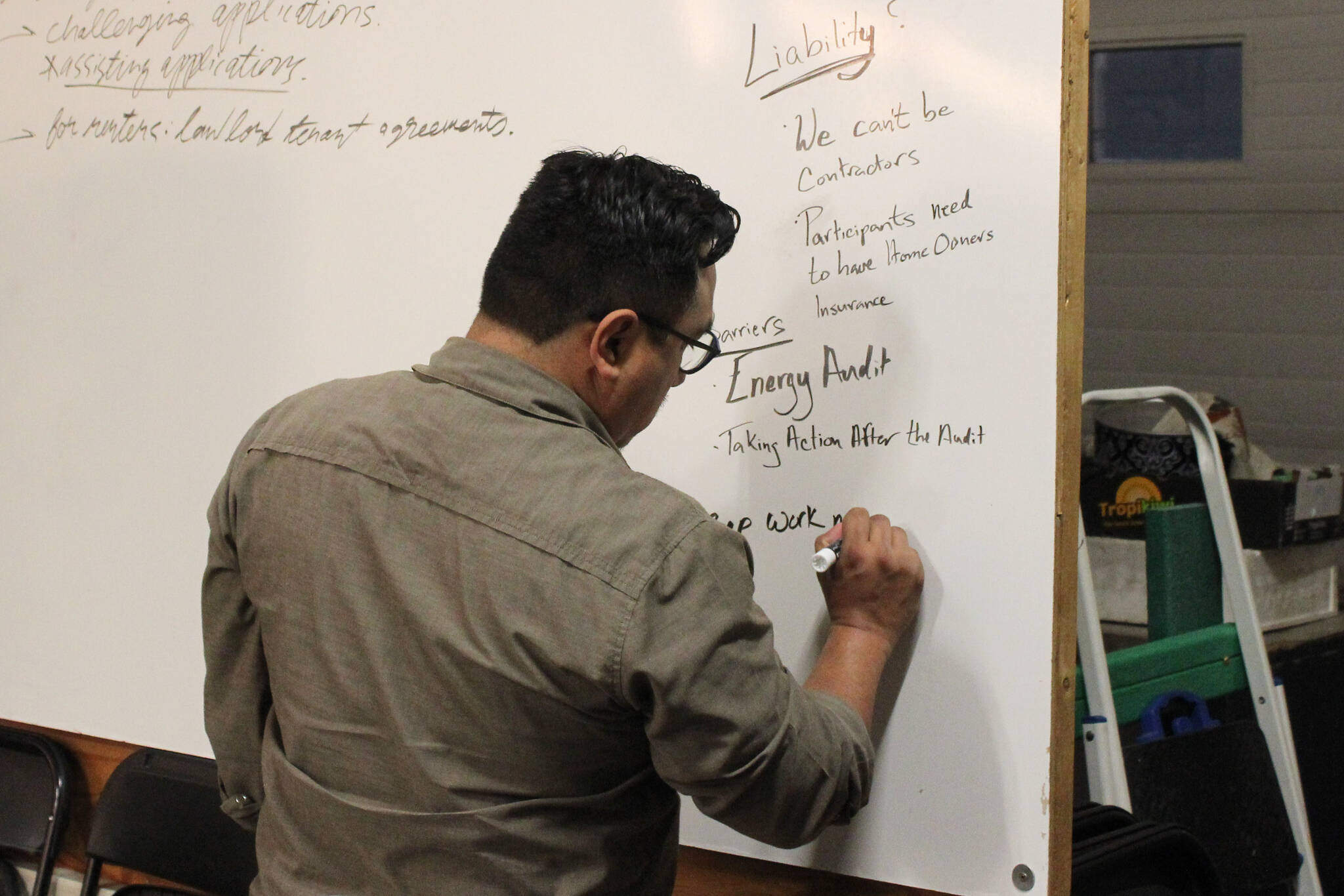As Southcentral Alaska stares down the barrel of a looming shortage of natural gas in Cook Inlet, one group of residents on the central Kenai Peninsula is taking energy efficiency into their own hands. Roughly 20 people gathered in Cook Inletkeeper’s Community Action Studio on Tuesday, Dec. 5, to talk about ways they can retrofit their homes to be more energy efficient.
The meeting marked the official kickoff of Cook Inletkeeper’s fourth installment in its local solution series, which debuted in 2019 as the “Drawdown: Book to Action Climate Series.” The series uses as its framework the book “Drawdown: The Most Comprehensive Plan Ever Proposed to Reverse Global Warming,” with early meetings structured around different chapters.
The group has successfully planned and executed three other large-scale community initiatives as part of the series.
A decentralized composting program kicked off the series and has resulted in tens of thousands of pounds worth of compostable material being diverted from landfills on the central peninsula. That program was followed by “Solarize the Kenai” in 2020, which helped make it more affordable for people to bring solar power to their homes in Seward, Soldotna and Homer.
Last year, the group launched Project RE-Tree, which had a stated goal of planting 5,000 trees on the central peninsula to restore and enhance treecover in neighborhoods and public spaces. This summer, staff and volunteers with Cook Inlet could be found distributing seedlings at community events and stocking free tree stands with saplings repotted from spaces around town.
David Knight, Cook Inletkeeper’s community engagement coordinator, told attendees at the Dec. 5 meeting that, through Project RE-Tree, 3,226 trees were planted. An additional 500 seedlings will be raised this winter under the direction of local forester Mitch Michaud.
“The solutions that we’ve done so far have been done by a small group of people,” Cook Inletkeeper Central Peninsula Regional Director Kaitlin Vadla told attendees Tuesday. “It’s been amazing what we can accomplish if we focus our efforts.”
It’s with those recent successes under their belt that the group began mapping out their next project: Energize the Kenai.
Last Tuesday’s session was led by Ben Boettger, Cook Inletkeeper’s energy policy analyst, who said the goal of the project is to make energy efficiency improvements more accessible by connecting homeowners with “low level” tasks, such as improving the quality of their home’s insulation or weatherizing doors and windows.
“That, kind of, space of retrofit solutions is something that we could help people do by doing it as a community,” Boettger said.
The project, he said, would operate under a “do-it-ourselves” model — the operative word being “our.” By pooling resources, Boettger said that project participants with similar home types, in the same neighborhood or who have shared ideas for becoming more energy efficient can work together.
“If we get the right number of people and make the right number of contacts, we could use the same kind of cooperative buying model to bid on materials and professional services,” he said.
The group also considered how it could leverage existing energy efficiency opportunities, such as the Alaska Community Development Corporation’s Weatherization Assistance Program. Larry Opperman, an attendee, said the group should incorporate work previously done on energy efficiency in Alaska and keep in mind that retrofit costs may be prohibitive.
“There’s a resource already out there to make these things happen that you’re talking about,” Opperman said.
One path forward, literature distributed by Cook Inletkeeper at the meeting says, is for program participants to all chip in for energy audits, which are professional evaluations of a building’s energy consumption that include suggestions for potential improvements.
“As in Solarize (the Kenai), having a schedule of known customers lowers the auditor’s logistics and marketing costs so they can offer services for less, and competition for the pool of customers incentivizes them to give the best discount,” a handout explaining the project says.
The project proposal also addresses potentially scaling the model up, to address energy consumption by public buildings, such as those owned by the Kenai Peninsula Borough and the Kenai Peninsula Borough School District.
Also supplied to attendees Tuesday was a copy of a Nov. 14 memo written by Scott Waterman to Kenai Peninsula Borough Mayor Peter Micciche. Waterman, who chairs the borough’s Resilience and Security Advisory Commission, wrote that KPBSD spends about $5.5 million per year to heat and power school buildings, which “vary widely in their energy efficiency.”
“Heat pumps and efficiency measures in borough-funded schools would avert both expenses for borough tax payers and carbon emissions,” Waterman wrote.
Boettger said everyone foots the cost of energy inefficient public buildings.
“Whether you’re a homeowner or not, whether you have a super tight house or a super leaky house, you end up paying for the energy use of public buildings,” he said. “Schools, in particular, are big energy consumers.”
Moving forward, attendees floated the idea of holding an “application party” where they convene and help each other apply for the Weatherization Assistance Program, holding lectures with experts in the field of energy efficiency and compiling a list of local contractors who perform energy audits and other efficiency services.
More information about Cook Inletkeeper’s local solutions series can be found on the organization’s website at inletkeeper.org/localsolutions.
Reach reporter Ashlyn O’Hara at ashlyn.ohara@peninsulaclarion.com.


